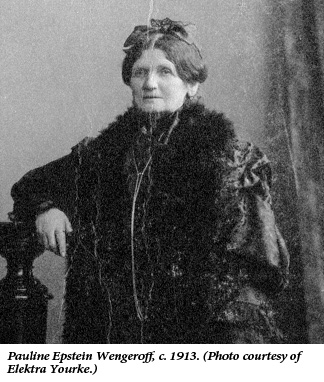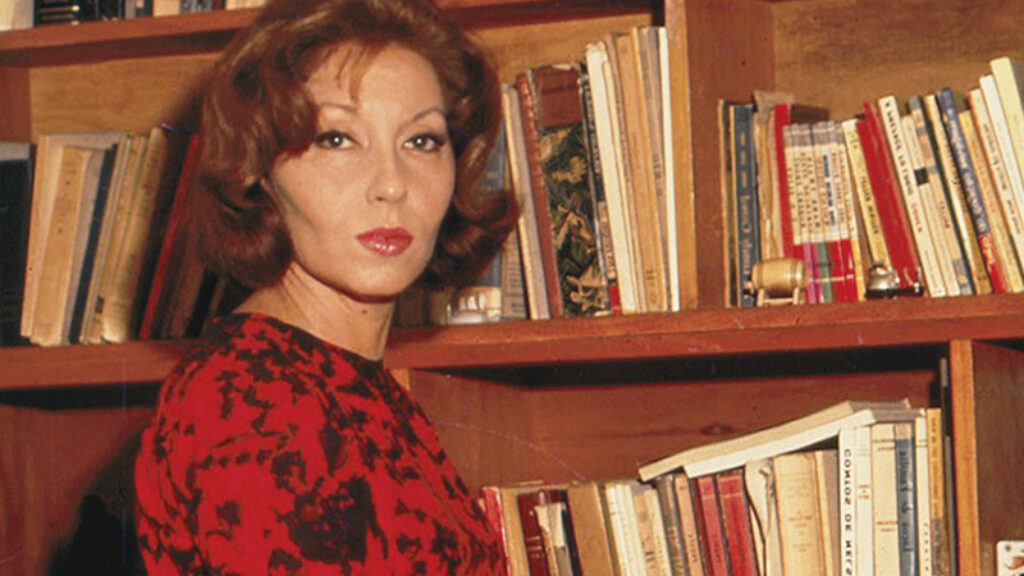Jocasta Speaks
For all of the talk about Jewish mothers, the Oedipal script of Jewish modernity assigns the most important parts to fathers and sons. Mothers appear chiefly as objects of filial guilt and condescension; Jewish literature, from Tevye the Dairyman to Portnoy’s Complaint is largely an exercise in maternal containment. Jewish autobiography rarely speaks in the voice of Jocasta, the tragic queen-mother, doubly betrayed by her husband-son. But in the memoirs of Pauline Wengeroff, the self-appointed grandmother of modern Russian Jewry, Jocasta gets her say at last.
Written at the turn of the 20th century, Wengeroff’s Memoirs of a Grandmother infiltrated Russian-Jewish scholarship as a primary source on the ordinary life of traditional Jewry, a world that Wengeroff claimed to have remembered and reproduced with unimpeachable and loving accuracy. Indeed, the “scenes from the cultural history of the Jews of Russia” depict a Jewish domestic Utopia intended to move the hearts of wayward and ungrateful children. Undeterred by the pathos of her narrative, historians have generally been content to defer to Wengeroff’s self-conferred authority as a dispassionate ethnographer.
Wengeroff wrote her book in German and until recently it had been available only in the original and in Russian translation. (After publication it was serialized in the Russian-Jewish literary weekly Voskhod.) Lucy Dawidowicz included a short but tantalizing excerpt in her 1967 anthology The Golden Tradition. Readers of Dawidowicz encountered Wengeroff’s autobiography as an astringent indictment of her husband and his contemporaries, swept up by the tide of secularization:
Young Jewish men had no sense of moderation . . . The woman, the mother was cruelly brushed aside . . . She wanted to transmit the great treasure of Jewish tradition along with the new currents of Western European culture. But the husbands had the same answer to all pleas: ‘The children need no religion.’ [. . .] They demanded not only assent from their wives but also submission. They preached freedom, equality, fraternity in public, but at home they were despots.
A shortened and emotionally attenuated version, entitled Rememberings, translated by Henny Wenkart and edited by Bernard Dov Cooperman, appeared in 2000. Now, thanks to Shulamit S. Magnus, Wengeroff’s latest and most devoted editor and translator, English speakers have an opportunity to read a faithful and complete translation, and to assess Wengeroff’s credibility as a torchbearer for a world that she described as “very peaceful, pleasant, earnest, and sensible.” Wengeroff is a seductive narrator; and Magnus is understandably seduced. But anyone looking for a beloved bubbie in the figure of Pauline Wengeroff is likely to be disappointed. Intent on memorializing the innocence of her Jewish childhood in an age of unbelief, Wengeroff instead offers up a record of female Jewish rage.

For all of the attention she lavishes on Jewish faith and practice, Wengeroff’s memoir is hardly a ringing endorsement of a return to an ideal time when women ruled the roost and men pored over the Talmud. Wengeroff reclaims female Jewish virtue not out of guilt and sentiment but out of a profound sense of social and intellectual entitlement, devastated by her own exclusion from the modern Jewish project.
Born in the 1830s in close cultural and familial proximity to the Lithuanian center of Jewish wealth and learning, Wengeroff came of age during the transition from the reign of Nicholas I (r. 1825-1855) to the reign of Alexander II (r. 1855-1881), known as the “Tsar Liberator.” Jewish history remembers Nicholas chiefly as the author of “official enlightenment” and the notorious conscription law, which swept 70,000 Jewish minors into the ranks of the pre-reform army, where two-thirds of them converted to Russian Orthodoxy. Alexander II scrapped Nicholas’ “cantonist battalions,” emancipated the serfs, and attempted through a wide-ranging series of measures to encourage the creation of Russian civil society. Alexander’s Jewish subjects had every reason to greet the demise of “Nicholas, the Stick” with jubilation. For Wengeroff, writing fifty years later, the memory of Nicholas represented the lost youth of Russian Jewry. The end of the Nicholaevan period spelled the demise of the patriarchal Jewish Utopia, embodied in Wengeroff’s own severe and distant father whom she idolized. Rewriting the contrast between Nicholas and his heir, she carped on the difference between the “strapping military bearing” of the old emperor and the notable lack of “self-confidence” of his “affable” son. This contrast between the regal authority of the father and the amiable fecklessness of the crown prince anticipates Wengeroff’s eventual disillusionment with the smiling promise of liberation. In her own modern marriage, Wengeroff experienced the transition to the era of the Great Reforms as a form of intimate tyranny. Wengeroff’s sense of grievance, ultimately aimed at her husband and children, is not fully articulated until the second volume of her memoir (yet to be released by Stanford University Press), but it underlies the romantic picture of the Nicholaevan past, which she paints in the first volume.
Wengeroff’s cultural history of Russian Jewry unfolds against the background of her relationship with her father, Yudl Epstein, a successful businessman and graduate of the prestigious Volozhin yeshiva, who was well known for his learning. Although she spent most of her time in the female domestic orbit, Wengeroff does not see fit even to tell us her mother’s first name. Her father absorbs most of her thoughts, despite the fact that until she was old enough to do his laundry and cook for him, he hardly noticed her. The distance apparently made him all that much easier to worship. Even when she finally managed to attract his attention, their relationship seems to have been limited to his injunctions that she put more pepper in the fish. “Most of the time,” Wengeroff says, “he was pleased” with her efforts.
Should the reader wish to know what Yudl Epstein was like on those occasions when he was not “pleased,” Wengeroff provides a telling anecdote. The first and only time we witness Epstein in actual conversation with his bright and imaginative daughter has him threatening to “thrash her soundly” for the transgression of crying over a lost toy. The spectacle of harsh punishment for a barely discernible infraction does not exhaust the full horror of the experience. Young “Pessele” protests the beating by pleading that her father has mistaken his most winsome, deserving child for one of his other, less forgivable daughters. We are left to wonder what was worse for the girls in Yudl Epstein’s household: to be ignored by their father or to be noticed by him.
Wengeroff, the adult memoirist, actively seeks to exonerate her father; she refuses to see him as a cold and withholding narcissist and instead characterizes him as a victim, “impotent” against the depredations of modernity, stealthily brought into his house by his sons-in-law. Another such son-in-law will take Wengeroff herself away from her father’s roof and, ironically, rehearse the bitter disillusionment of her original filial romance almost exactly. Wengeroff’s identification with her father shapes her perception of Jewish emancipation under Alexander II not as a release from autocratic discipline but as a tragic derailment of patriarchal authority. Tellingly, she evades the most infamous example of Nicholaevan paternalism: the state’s adoption of Jewish children into the military. To miss the sense of grievance that drives Wengeroff’s autobiography is also to miss its contrarian politics. Memoirs of a Jewish Grandmother presents a conservative defense of Jewish tradition as a cover story for a radical polemic against modern marriage worthy of Betty Friedan.
In her elaborate introduction, Magnus attributes Wengeroff’s “gushing” over Nicholas I to the “confusion and complexity” implicit in the “modern dilemma.” But Wengeroff’s refractory, finger-wagging style shows no evidence of “confusion” and no trace of modern guilt. Wengeroff is not confused. She is angry. Every inch her father’s child, heir to his personal force, his name and reputation for learning, his public stature, and his capacious, mordant intellect, she is forced to live out her mother’s anonymous domestic enserfment in a middle-class Jewish home. The “impotence” of Wengeroff’s father in the face of modernity mirrors the daughter’s disempowerment by her liberated husband and children, all of them complicit in the “silencing” of the mother who refuses to sit quietly by, knitting and watching her spoiled and selfish offspring “speak about their [own] lives and ideals.”
It is unfortunate that Magnus and Stanford University Press have made the decision to follow the original publication history of this extraordinary book; the first volume was published in 1908, the second, two years later. Like Wengeroff’s first readers, we have only the beginning of a single-minded, carefully sustained argument about the betrayal of women by the “affable” Jewish husbands who apparently embraced the ideals of the Tsar Liberator, but who actually ruled their bourgeois homes with an iron fist. In the absence of the second volume, an embittered account of Wengeroff’s life as a wife and a mother, we are left with Magnus’ affirmative defense of Wengeroff’s Nicholaevan Utopia as a “creative response” to the male-centered nature of Jewish ritual life. But the second volume makes clear that the last thing that Wengeroff wanted to do was affirm the joys of Jewish domesticity.
Wengeroff’s post-emancipation critique of the modern Jewish family brings me to the problem of historical context. Memoirs of a Grandmother is a 20th-century Russian text. But you wouldn’t know it reading Magnus’ introduction and her endnotes (in which she expends inordinate energy explaining words like tefillin and rosh chodesh but has nothing to say about the striking quotation from Dead Souls that Gustav Karpeles used to introduce Wengeroff to her original German-speaking readers). Wengeroff’s revolutionary claim on the Russian-Jewish public sphere challenges Magnus’ presentation of her book as a defense of female domesticity. Her sense of thwarted ambition evolved against the background of widespread political disillusionment with the Great Reforms, characteristic of Russian high culture at the turn of the 20th century.
Instead of situating Wengeroff’s irremediable pessimism in the Russian Silver Age where it belongs, Magnus seeks to reclaim her for a non-existent genealogy of female Jewish autobiography exemplified chiefly by the early 18th-century memoir of Glüeckel of Hameln. As a result, we learn nothing about actual women’s writing in turn-of-the-century Russia. Yet the flood of reminiscence and recrimination involved in the fin de siècle battle for childhood directly inspired Wengeroff’s striking appropriation of her past.
The comparison with Glüeckel is overdrawn and seems beside the point, especially since more informative analogies might have been found closer to home, among the highly articulate middle-class women who shared Wengeroff’s cultural ambitions and social frustrations. Despite her own acknowledgement that Wengeroff “loved books and was herself a gifted and conscious writer,” Magnus has nothing to say about the connection between Wengeroff’s literary ambition and her prodigious reading in Russian, German, and English. Most blatantly, Magnus takes for granted Wengeroff’s counter-intuitive decision to write in German rather than her native Russian and to seek support among Western European scholars and rabbis rather than in her Russian circle.
On the whole, Magnus tends to treat Wengeroff as if she were a fellow Jewish historian, trying to chart a course between the demands of scholarly objectivity and the pull of ethnic loyalty. Magnus herself does not seem entirely comfortable in Wengeroff’s imaginative world. For instance, she describes Alexander Pushkin as “a man who composed Byron-like verse,” which is, in a sense, true, but hardly helpful. One wishes, perhaps, that Magnus had spent more of her time actually reading Pushkin, as well as other books that Wengeroff “loved” and less time trying to wedge her into the straitjacket of current scholarly wisdom about what constitutes “Jewish women’s history.” But Wengeroff’s unorthodox intractable fury requires no academic apology and no Jewish justification. Jocasta’s rage stuns her modern children into silence.
Suggested Reading

“I am an Object Loved by God”: Rereading Clarice Lispector
The great Brazilian novelist Clarice Lispector rarely acknowledged her own Jewishness but when the Jornal do Brasil fired her a few days after the Yom Kippur War broke out, something changed.

A Comic Megillah?
Megillat Esther has long balanced the comic and the graphic in its content and interpretations. A new Koren graphic novel takes the challenge a bit more literally.
Oh Homeland, Don’t You Wonder (Tzion Ha-lo Tishali)
Dan Alter translates Judah Halevi's poem of yearning for Zion from nearly a thousand years ago.

The Mighty Jacobson
For an American Jew to read the magnificently funny and serious Howard Jacobson is to understand just how different the situation of English Jews is from their own.
Comments
You must log in to comment Log In